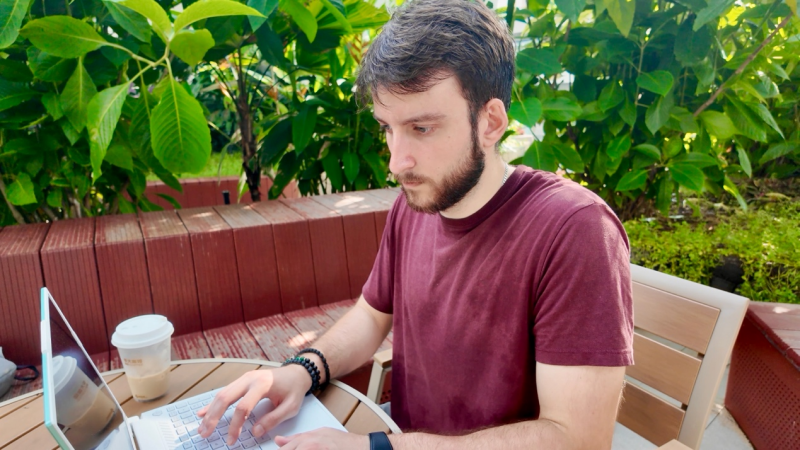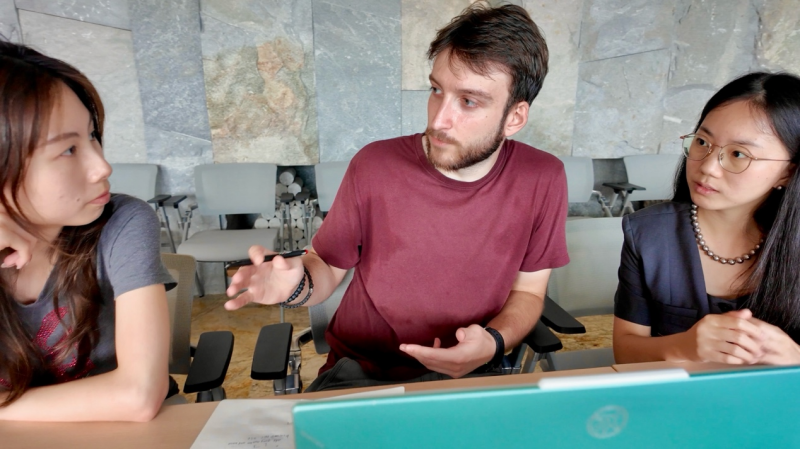- CN
Aug 12, 2025

Časlav Petronić's path from Serbia to BGI-Research in China has been fueled by a restless curiosity, a strong sense of discipline, and an enduring passion for exploration. As a student of software engineering at the Faculty of Electrical Engineering, University of Belgrade, Časlav has always believed in the power of knowledge. “I'm passionate about AI and science,” he says—a simple statement that has been the driving force behind his academic and professional choices.
 Časlav Petronić works at the BGI-Research Center.
Časlav Petronić works at the BGI-Research Center.
His adventure with BGI-Research began after years of dedication to academic competitions. Časlav and his friends entered the Mammoth International Contest on Omics Sciences (MICOS), organized by BGI Group, and their teamwork and experience paid off with a second-place finish. The award brought more than recognition—it offered a unique opportunity to spend a year as an intern at BGI-Research in China. “What we saw from pictures and what we saw on the internet really appealed to us. It looked like a very modern scientific place,” Časlav remembers. The reality, he soon discovered, was even more inspiring.
From day one at BGI-Research, Časlav quickly became part of a research team applying large language models to the field of genomics. “We work on multiple projects, and all of them try to implement large language models into current scientific fields,” he explains. He began with protein modeling, developing artificial intelligence systems that can tackle complex biological questions.
One of his team’s projects involved using AI to predict the toxicity of proteins discovered in the Mariana Trench. “The work I did in the previous team was related to large language models for proteins. It involved predicting the toxicity of some of the proteins found in the Mariana Trench by the BGI scientific expedition team,” he says. Časlav knows the potential impact of this work is enormous: “The work I’m doing can potentially help us find new drugs or solutions from the proteins found in the Mariana Trench.”
 Časlav discusses a project with his colleagues.
Časlav discusses a project with his colleagues.
Later, he joined a team focuses on DNA research, with the goal of building AI that can begin to “understand the language of life.” Časlav is fascinated by the similarities between teaching AI to interpret human language and training it to decode genetic information. “Because, as we can see with language, we taught AI how to understand English and other languages. And it gained some kind of intelligence—something we perceive as intelligence. If we give it life data in a similar way, it can hopefully understand the language of life,” he says.
Časlav believes the impact of artificial intelligence on science and society is only beginning to be felt. “AI is crucial for analyzing huge amounts of data, because computers have the capability to do that, and developing good software for understanding such things is crucial for doing it faster and more effectively,” he explains. He sees AI as, in his words, “just an electronic version of the biological computers that we humans or animals are,” and he believes that advancing technology is a way to speed up the process of understanding ourselves.
Reflecting on his time at BGI-Research, Časlav calls it a “once-in-a-lifetime experience,” and he is grateful for the chance to play even a small role in research that could change lives. “Any work contributing to this area can benefit any human alive. If we find solutions for new drugs or cures for diseases, that knowledge can help any human on the planet, including those in Serbia,” he says.
For Časlav, “knowledge is the most powerful thing, and the more you learn, the more it can help.” His journey is a reminder that a passion for learning and discovery knows no borders—and that every new insight brings us closer to understanding the language of life itself.